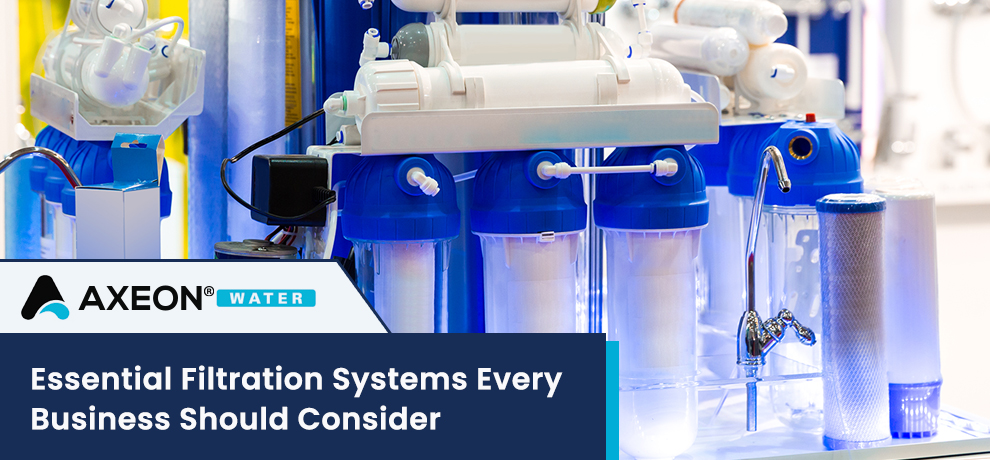Technical Articles

Maintaining optimal operations isn't just about productivity—it's about making smart investments in infrastructure that protect your equipment, products, and bottom line.
Filtration systems are essential yet frequently underestimated elements of business operations. They are critical for maintaining quality, enhancing efficiency, and extending the lifespan of various industrial processes.
Whether you're managing a manufacturing facility, running a commercial kitchen, or operating a pharmaceutical lab, the right filtration solution can mean the difference between seamless operations and costly disruptions.
This blog will discuss key filtration systems that businesses should consider, guiding you in choosing the right options for your needs and industry standards.
Types of Filtration Systems
Reverse Osmosis (RO) Systems
Reverse osmosis is a widely adopted technology for producing high-purity water. RO systems use a semi-permeable membrane to remove dissolved solids, contaminants, and impurities from water. The process involves applying pressure to overcome osmotic pressure, forcing water molecules through the membrane while retaining larger molecules and ions.Key components of an RO system include:
- High-pressure pump
- Semi-permeable membrane
- Pressure vessels
- Pre-treatment and post-treatment equipment
RO systems are particularly effective in removing total dissolved solids (TDS), producing water with TDS levels often below 50 ppm.
Ultrafiltration (UF) Systems
Ultrafiltration systems use a membrane with pore sizes ranging from 0.1 to 0.001 microns. UF is effective in removing suspended solids, bacteria, and some viruses. While not as fine as RO membranes, UF systems operate at lower pressures and can handle higher flow rates.Nanofiltration (NF) Systems
Nanofiltration falls between RO and UF in terms of selectivity. NF membranes can remove divalent ions, organic molecules, and some monovalent ions. This makes NF systems suitable for applications requiring selective ion removal, such as water softening.Media Filtration Systems
Media filtration systems use various materials like sand, anthracite, or activated carbon to remove particulates and organic compounds from water. These systems are often used as pre-treatment for RO or NF systems to reduce fouling potential.Factors to Consider When Choosing a Filtration System
Water Quality Analysis
Before selecting a filtration system, a comprehensive water analysis is crucial. This analysis should include:- Total Dissolved Solids (TDS)
- Hardness and alkalinity
- Specific ion concentrations (e.g., calcium, magnesium, chloride, sulfate)
- pH and temperature
- Silt Density Index (SDI)
Required Flow Rate and Production Capacity
The system's capacity should match the business's water demand. This is typically expressed in gallons per day (GPD) or liters per hour (LPH). The recovery rate, which is the ratio of permeate (product water) to feed water, is an important consideration. The recovery rate can be calculated using the following formula:
If a system makes 75 gallons of permeate from 100 gallons of feed water, the recovery rate is 75%.
Energy Efficiency
Energy consumption is a significant factor in operational costs. RO systems typically require more energy than UF or media filtration systems due to the high pressures involved. However, innovations in membrane technology and energy recovery devices have improved RO system efficiency.Performance Metrics for Filtration Systems
Salt Rejection Rate
Salt rejection rate measures the percentage of dissolved salts removed by the membrane. In reverse osmosis systems, the efficiency usually exceeds 95%. The salt rejection rate can be calculated using:
Permeate Flow Rate
The permeate flow rate indicates the system's production capacity. It's affected by factors such as feed water temperature, pressure, and membrane condition. Monitoring permeate flow over time can help identify membrane fouling or scaling issues.Differential Pressure
Differential pressure (ΔP) is the pressure difference between the inlet and outlet of the membrane system. An increase in ΔP over time may indicate fouling or scaling. Regular monitoring of ΔP is essential for system optimization and maintenance planning.Maintenance and Optimization
Regular Monitoring and Data Logging
Consistent monitoring of key parameters such as flow rates, pressures, and conductivity is crucial for maintaining system performance. Implementing a data logging system allows for trend analysis and early detection of performance issues.Cleaning Procedures
Membrane cleaning is essential to maintain system efficiency. The frequency and type of cleaning depend on feed water quality and system design. AXEON offers specialized cleaning solutions such as C-10 (low pH) and C-20 (high pH) for effective membrane cleaning.Membrane Replacement
Even with proper maintenance, membranes will eventually require replacement. The lifespan of membranes can vary from 2 to 5 years, depending on operating conditions and maintenance practices.Cost Considerations
When evaluating filtration systems, businesses should consider both initial investment and operational costs. Factors affecting total cost of ownership include:- Equipment and installation costs
- Energy consumption
- Membrane replacement frequency
- Chemical usage for cleaning and pre-treatment
- Labor for operation and maintenance
Conclusion
Selecting the right filtration system is crucial for businesses to ensure a reliable supply of high-quality water. Understanding different filtration systems, their performance metrics, and maintenance needs helps businesses make informed decisions about their water quality and operational goals.With rising global water scarcity and quality problems, investing in efficient water filtration technology is essential. Partnering with experienced providers like AXEON Water Technologies allows businesses to use advanced filtration systems and receive expert support for better water treatment.
Take the Next Step Toward Optimal Filtration
Ready to enhance your business operations with the right filtration system? Our experts are standing by to help you make the best choice for your specific needs.Get a Custom Quote
Tell us about your requirements, and we'll provide a detailed quote tailored to your business:- Complete system specifications
- Installation recommendations
- Maintenance plans
- Pricing options
- ROI analysis
Speak With an Expert Have questions or need immediate assistance? Our technical team is ready to help:
- Get expert recommendations
- Discuss your specific challenges
- Learn about available solutions
- Understand maintenance requirements
Available Monday - Friday, 7:30 am - 4:30 pm PST
Don't let inadequate filtration impact your business. Contact us today for a solution that fits your needs and budget.
THE RIGHT SOLUTION FOR YOU
Contact us today for more information about our products and services.
CONTACT US

